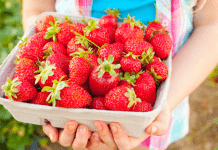This post is written and sponsored by Midwest Dairy.
Real dairy delivers on nutrition, but don’t forget adding dairy to your diet is also delicious! From enjoying your morning latte, to grabbing a cheese stick on your way out the door to wrapping up your day with a glass of milk and your favorite dessert – you can feel good about choosing dairy… and your tastebuds will thank you, too!
Here are four things to know about dairy.
Milk is good for all ages.
From supporting growth and development in toddlers to aging vibrantly in adults, milk provides essential nutrients like calcium, vitamin D, high-quality protein, phosphorus, vitamin B12 and more. Milk is naturally nutritious, with fewer added ingredients than alternatives.
Being lactose intolerant doesn’t mean you have to give up your favorite dairy foods.
Try these easy tips for enjoying milk, cheese, and yogurt, and watch for more tips on managing lactose intolerance.
- Choose lactose-free milk and dairy products. They are real milk products, just without the lactose. You’ll get the same great nutrients as in regular dairy foods.
- Choose yogurts with live, active cultures, which help to break down lactose.
- Try Cheddar, Colby, Swiss, Gouda, Monterey Jack, and Mozzarella. Hard cheeses are low in lactose making them easier to digest.
- Try consuming small amounts of milk or dairy foods and slowly increase the amount over several days or weeks.
Yogurt is linked to improved digestive health.
Your gut is essential for absorbing nutrients from the foods you eat, removing waste from your body and protecting your health. Eating fermented and probiotic-rich foods (like yogurt) helps maintain a balance between good and bad bacteria in the gut. Yogurt is power packed providing essential nutrients like high-quality protein, calcium, potassium, zinc and more! From smoothies to dips to baked goods, cooking with yogurt can add less fat and more protein to recipes. Wondering about the different types of yogurts you see in the dairy aisle? Get the scoop here.
Dairy cares about the planet.
From the farm to your fridge, U.S. dairy is taking steps to reduce food waste and greenhouse gas emissions. Compared to 70 years ago, making a gallon of milk now requires 90% less land, 65% less water and 63% smaller carbon footprint, yet milk still has the same nutritional benefits and great taste. U.S dairy farmers are committed to reducing their footprint even further as part of the dairy industry’s 2050 Sustainability Goals.

















